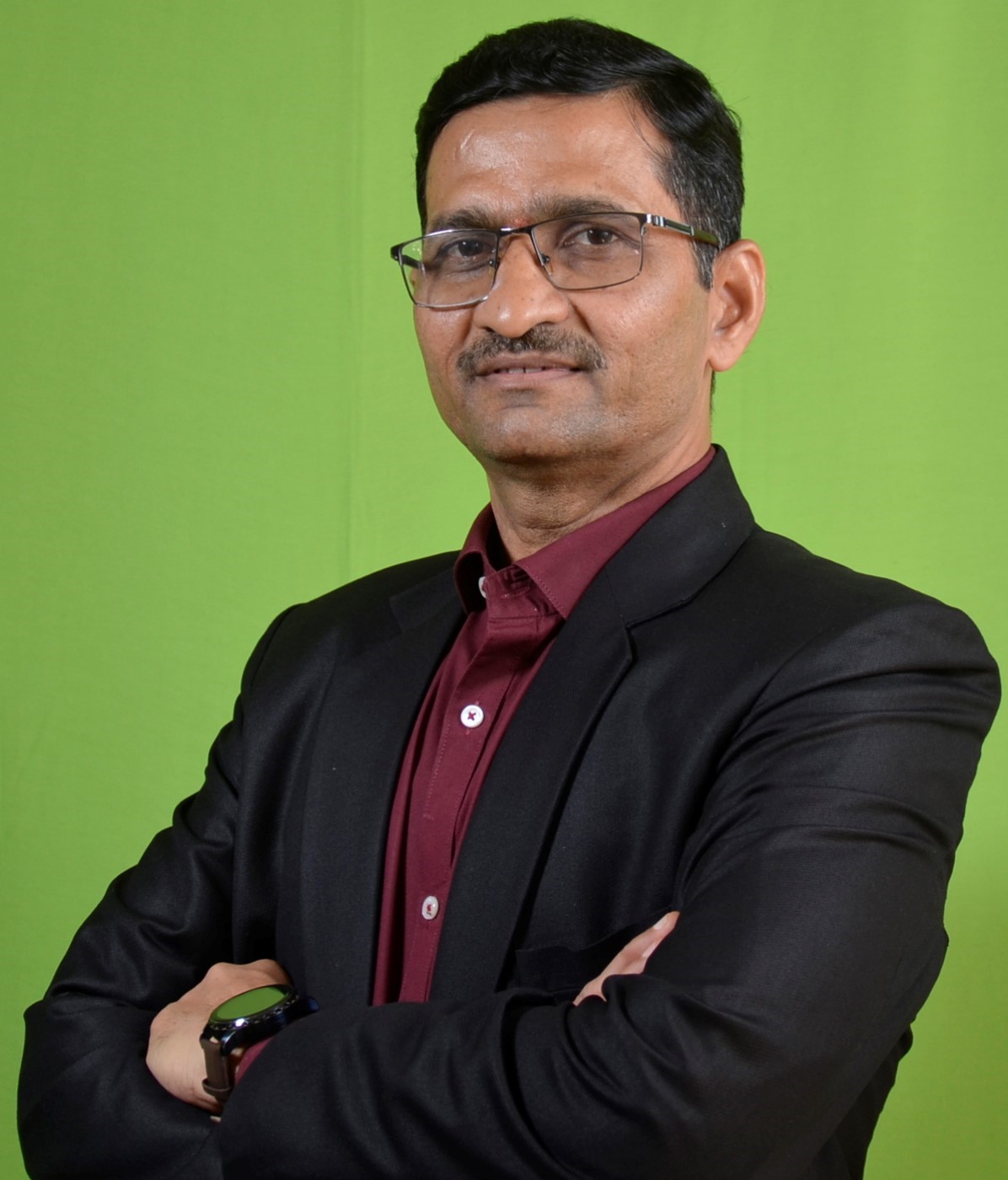Director and Professor (CSE), Founder Director Microsoft Innovation Centre
Sri Aurobindo Institute of Technology, Indore, MP

Dr. Durgesh Kumar Mishra has received M.Tech. degree in Computer Science from DAVV, Indore in 1994 and a Ph.D. degree in Computer Engineering in 2008. Presently, he has been working as a Director and Professor SCSIT, Symbiosis University of Applied Sciences, Indore. He was founder Director, Microsoft Innovation Centre at SAIT, Indore, India. He is associated with Namibia University of Science and Technology as the Program Advisory Committee for Doctor of Philosophy Computer Science (NQF level 10). Ex-visiting faculty at IIT-Indore. He has 30 years of teaching and 15 years of research experience with a good number of citations with h-index and i-index. He has four patents granted and twelve published jointly with Ph.D. students and more than 100 papers in refereed journals and conferences in his research field. His Ph.D. is in Secure Multi-Party Computation for Preserving Privacy. He has organized a number of IEEE, ACM, and Springer conferences in the capacity of conference General Chair and editor of conference proceedings. He is a Sr Member of IEEE, ACM, and CSI and held many positions like Chairman, IEEE Computer Society Madhya Pradesh Section(2022 to 2023),IEEE MP-Subsection (2011-2012), and Chairman IEEE Computer Society Bombay Chapter (2009-2010). Chairman CSI Division IV Communication at National Level (2014-2018). National Treasurer Computer Society of India (2019-2021). At Present he is the Chairman IEEE Madhya Pradesh Section and Chairman of ACM Indore Chapter. Dr. Mishra visited and delivered his invited talk in Taiwan, Bangladesh, Singapore, Indonesia, Sri Lanka, Nepal, the USA, UK, and France. He has authored two books on “Database Management Systems” and “Programming in C and C++”. He edited 12 international books of Springer publication in his domain of Computer Science. He has been a consultant to industries and government organizations like the sales tax and labor department of the government of Madhya Pradesh, India. He has been awarded the “Paper Presenter award at International Level” by the Computer Society of India. He visited MIT Boston and presented his presentation on Security and Privacy he has also Chaired a panel on “Digital Monozukuri” at “Norbert Winner in 21st century” at BOSTON. He became a Member of the Bureau of Indian Standards (BIS), Govt of India for the Information Security domain. Recently, Microsoft invited him for his felicitation and to deliver his Innovation at Xi’an China. He has the recipient of many awards from the largest professional society CSI. Recently VDGOOD Society India, Awarded him as International Scientist Award for Engineering, Science, and Medicine. .
Sri Aurobindo Institute of Technology, Indore, MP
Indian Institute of Technology , Indore
Acropolis Institute of Technology and Research, Indore
Medicaps Institute of Technology and Management, Indore
Maharaja Ranjeet Singh College, Indore
DAVV , Indore
M.B. Khalsa College, Indore
I.K.D.C, Indore

Ph.D. in Computer Engineering
Devi Ahilya Vishwavidyalaya, Indore

Master of Technology
Devi Ahilya Vishwavidyalaya, Indore

Batchalor of Computer Education
Devi Ahilya Vishwavidyalaya, Indore

Master Of Science(Higher Maths)
S.N College, Sager University, Khandwa
Privacy and Security are hot and complicated topics in the modern society within which we live. Information and Communication Technology (ICT) have always been accompanied with security and privacy techniques. Security ensures protection of data of parties in the eco system from unauthorised access and privacy lets the information to be computed and transmitted such that it seems unintelligible to any unauthorised person. Traditionally, these goals have been achieved using private and public key cryptography.
Consider a set of parties who do not have trust in each other, nor in the channel by which they communicate. Even then the parties wish to correctly compute some common function of their local inputs, while keeping their local data secure from others. This, in a nutshell, is the problem of secure multi-party computation (SMC). This problem is fundamentally in cryptography and in the study of distributed computations. In my research, we will discuss several aspects of SMC. We first present the definition in various situations. Next, we discuss the problem of hiding the data form trusted third party (TTP) with architecture of SMC for various applications.




The Mobile ad hoc networks served as explanatory facts on various issues and challenges to learn threats in security of wireless data. This data is actually moves around various components of ad hoc network to perform various operations. The confliction comes when a data is associated with multiple components and reflects the different outputs inside the network. Then it vanish many legitimate operations and creates nuisance or misconduct with participating nodes. Trust overlay can describe respective policies to opt a node to communicate data inside a network. The applications of SMC protocols showed a great impact and useful derivations to compute the secure result at various levels. Further, the various frontiers of infrastructure less networks are in keen interest to serve better with minimal delay in transmission of packets. That means the probability of occurrences of packet drops can also be address with respect to various attacks and countermeasures. This work emphasizes on inside view in an ad hoc network to find and eliminate various security threats to rectify nuisance created by multi association of freely moving data.
Read Moresecure multi-party computation is widely studied area in computer science. It is touching all most every aspect of human life. This paper demonstrates theoretical and experimental results of one of the secure multi-party computation protocols proposed by Shukla et al. implemented using visual C++. Data outflow probability is computed by changing parameters. At the end, time and space complexity is calculated using theoretical and experimental results.Read More
In Secure Multiparty Computation (SMC), multiple parties perform joint computation over their private data inputs preserving the privacy of their individual inputs. This type of computation needs to provide correct result while keeping the individual input a secret. In today's scenario of tremendous growth of the Internet and large volumes of online transactions, the concept of data privacy and SMC has become a matter of great concern. People frequently need to perform joint computations for the sake of their mutual benefits, but they are also worried about confidentiality of their private data. This situation arises due to lack of trust among computing parties. For example, two banks may want to find some details of a customer but each of the banks may want to keep their sensitive database a secret or they may not want to disclose the customer's identity. The subject of SMC has evolved from earlier solutions of combinational logic circuits to the recent proposals of anonymity-enabled computation. In this paper, we put together the significant research that has been carried out. We propose new possibilities of problem discovery and its analysis. We put critical issues and challenges and the level of adaptation achieved before the researchers. We also provide some research proposals based on the literature survey. Read More
Although a substantial amount of research has examined the constructs of warmth and competence, far less has examined how these constructs develop and what benefits may accrue when warmth and competence are cultivated. Yet there are positive consequences, both emotional and behavioral, that are likely to occur when brands hold perceptions of both. In this paper, we shed light on when and how warmth and competence are jointly promoted in brands, and why these reputations matter.Read More
In this paper, we show how our secured multiparty computation (SMC) protocols protect the data of an organization during the war from the cyberspace war when a large number of defense units interact with one another, while hiding the identity and computations done by them. SMC is a problem of information security when large organizations interact with one another for huge data sharing and data exchange. It is quite possible that during sharing and exchange, the private data also get hacked. In order to protect and secure the private data, the protocols of SMC need to be deployed in the large computer networks on which the organizations work. The protocols work at the micro-level in terms of cryptography with which the data are encrypted and then shared, while allowing the keys to be used for sharable data while also keeping the keys untouched for private data. At the macro level, multilevel architectures are used for different types of security to be achieved. The computation part of the secured multiparty computation is based on the algorithmic complexity theory. The algorithms realize the protocols in such a way that it is tedious to break (decrypt) the keys to hack the private data. Read More
Nanotechnology enabled RFID (Radio Frequency Identification) has been introduced in recent years but issues regarding their reliability, commerciability and application still needs to be resolved. The current market of Nano RFID is still in embryonic state which will be growing in the upcoming years if these issues are addressed. This paper explores the details of the commerciability of the Nano RFID System for various industrial applications. The formulation for Time for market and Game theoretical approach is modeled for Nano RFID systems. Nano RFID will be a very important tool and its application in Food, Bio and Banking explorations has been proposed in recent years which can be implemented using this proposal. Commercialization of Nano RFID system also depends on the knowledge and implementation of aspects such as device reliability of MEMS antenna and transponders. This idea has been derived from the earlier research done in MEMS reliability, multi scale modeling and modeling using HPC of the setup. Read More
Secure sum computation of private data inputs is an important component of Secure Multi party Computation (SMC).In this paper we provide a protocol to compute the sum of individual data inputs with zero probability of data leakage. In our proposed protocol we break input of each party into number of segments and change the arrangement of the parties such that in each round of the computation the neighbors are changed. In this protocol it becomes impossible for semi honest parties to know the private data of some other party.
Secure Multi-Party Computation (SMC) allows multiple parties to compute some function of their inputs without disclosing the actual inputs to one another. Secure sum computation is an easily understood example and the component of the various SMC solutions. Secure sum computation allows parties to compute the sum of their individual inputs without disclosing the inputs to one another. In this paper, we propose a modified version of our ck-Secure Sum protocol with more security when a group of the computing parties conspire to know the data of some party.Read More
Secure sum computation of private data inputs is an interesting example of Secure Multiparty Computation (SMC) which has attracted many researchers to devise secure protocols with lower probability of data leakage. In this paper, we provide a novel protocol to compute the sum of individual data inputs with zero probability of data leakage when two neighbor parties collude to know the data of a middle party. We break the data block of each party into number of segments and redistribute the segments among parties before the computation. These entire steps create a scenario in which it becomes impossible for semi honest parties to know the private data of some other party.Read More
Data mining is the discovery of knowledge and useful information from the data stored in large databases. The classification of large data sets is an important problem in data mining. Most data mining algorithms cannot be applied to complex object databases unless it is converted into a single flat table. Much valuable information especially the linkages between objects could be lost by conversion of such databases into a single table. As object-oriented data models embody rich data structures and semantics in the construction of complex databases, such as complex data objects, class hierarchies, property inheritance and methods, etc. So it is important to extend the area of study from relational database systems to object-oriented database systems and investigate the mechanisms for knowledge discovery in object-oriented databases. This paper presents a brief review of some of the significant researches available in the literature for object-oriented data mining. Read More
Secure Multi-Party Computation (SMC) allows parties with similar background to compute results upon their private data, minimizing the threat of disclosure. The exponential increase in sensitive data that needs to be passed upon networked computers and the stupendous growth of internet has precipitated vast opportunities for cooperative computation, where parties come together to facilitate computations and draw out conclusions that are mutually beneficial; at the same time aspiring to keep their private data secure. These computations are generally required to be done between competitors, who are obviously weary of each-others intentions. SMC caters not only to the needs of such parties but also provides plausible solutions to individual organizations for problems like privacy-preserving database query, privacy-preserving scientific computations, privacy-preserving intrusion detection and privacy-preserving data mining. This paper is an extension to a previously proposed protocol Encrytpo_Random, which presented a plain sailing yet effective approach to SMC and also put forward an aptly crafted architecture, whereby such an efficient protocol, involving the parties that have come forward for joint-computations and the third party who undertakes such computations, can be developed. Through this extended work an attempt has been made to further strengthen the existing protocol thus paving the way for a more secure multi-party computational process. Read More
Secure Multiparty Computation (SMC) allows parties to know the result of cooperative computation while preserving privacy of individual data. Secure sum computation is an important application of SMC. In our proposed protocols parties are allowed to compute the sum while keeping their individual data secret with increased computation complexity for hacking individual data. In this paper the data of individual party is broken into a fixed number of segments. For increasing the complexity we have used the randomization technique with segmentation. Read More
Information management and retrieval of all the citizen occurs in almost all the public service functions. Electronic Government system is an emerging trend in India through which efforts are made to strive maximum safety and security. Various solutions for this have been proposed like Shibboleth, Public Key Infrastructure, Smart Cards and Light Weight Directory Access Protocols. Still, none of these guarantee 100 percent security. Efforts are being made to provide common national identity solution to various diverse Government identity cards. In this paper, we discuss issues related to these solutions.
As conference General Chair, Organized an IEEE 10th International Conference on Wireless and Optical Communication Network, 26-28 July 2013 at Bhopal.
As conference General Chair, Organized an IEEE 9th International Conference on Wireless and Optical Communication Network, 20-22 Sep 2012 at Indore in association with IIT Indore and SAIT Indore.
As conference Organizing Chair, Organized CSI 6th International Conference on Software Engineering, 5-7 Sep 2012 at Indore in association with IEEE and DAVV Indore.
As conference Co-Chair, Organized an IEEE 3rd Asian Himalaya Conference on Internet 23-25 Nov 2012 at Kathmandu NEPAL in association Nepal Institute of Technology Nepal.
As conference Convener, Organized an First National Conference on Technological Research in Electrical and Electronics, 09-10 Oct 2012 at SAIT Indore.
As conference convener, Organizing an IEEE 4th International Conference on Wireless Communication & Sensor Network, on 26 – 29th Dec 2008. This conference is Jointly organized by Acropolis Institute of Technology and research, IIIT-Allahabad, IET-DAVV-Indore and IEEE MP-Subsection.
As Program committee Chair, Organized a National Conference on Software Engineering and Information Security on 23rd – 24th November 2009 at Acropolis Institute of Technology and Research, Indore, MP, India.
As Program committee Chair, Organized a National Conference on Software Engineering and Information Security on 23rd – 24th December 2010 at Acropolis Institute of Technology and Research, Indore, MP, India.
As Member of the program committee in 8th European Conference on Information Warfare and Security Military Academy, Lisbon & the University of Minho, Braga, Portugal. 6-7 July 2009
As Member of the program committee in IEEE International conference ASM2010, at KotakinaBalu, Malaysia on 24th – 28th May 2010.
As Member of the program committee in IEEE International conference ASM2010, at KotakinaBalu, Malaysia on 24th – 28th May 2010.
A One day IEEE workshop on “Open Source and Application” is organized on 14th June 2008 Jointly by Acropolis Institute of Technology and Research-Indore, IET-DAVV-Indore and and IEEE MP-Subsection at International Institute Professional Studies DAVV Indore.
A Two day IEEE Workshop on “Introduction to MATLAB and Simulink” on 7-8th Aug 2008 at Acropolis Institute of Technology and Research, Indore.
Workshop on “Ethical hacking” by International Speaker “Ankit Fadia” on 20th Nov 2007 at Acropolis Institute of Technology and Research, Indore.
Workshop on “Research Methodology” on 8th Sep 2007 at Acropolis Institute of Technology and Research, Indore.
Attended a workshop on E-Resource Management with INDEST-AICTE user meet in conjunction with Twenty fifth National Convention and conference of SIS (SIS 2008) on Role of the librarian in 21st century, Organized by Indian Institute of Management, Indore, 5-6 Dec 2008.
I would be happy to talk to you if you need my assistance in your research or Whether you need technical support for your organization. Though I have limited time for other activities, then teaching even I will be happy to support for organizing conferences at your place. I have three hands on workshop for students and two talks for faculties.
office:0731-4231646
mobile: 09826047547
durgesh.mishra@sait.ac.in
drdurgeshmishra@gmail.com
You can find me at my office located at Sri Aurobindo Institute of Technology, SAIMS Campus, Indore-Ujjain Highway, Near MR-10 crossing, Indore, Madhya Pradesh 453111
I am at my office every day from 10:00 am to 05:00 pm
You can find me at my Microsoft Innovation Center located at 4th floor Sri Aurobindo Institute of Technology, SAIMS Campus, Indore-Ujjain Highway, Near MR-10 crossing, Indore, Madhya Pradesh 453111
I am at my office every day from from 10:00 am to 05:00 pm